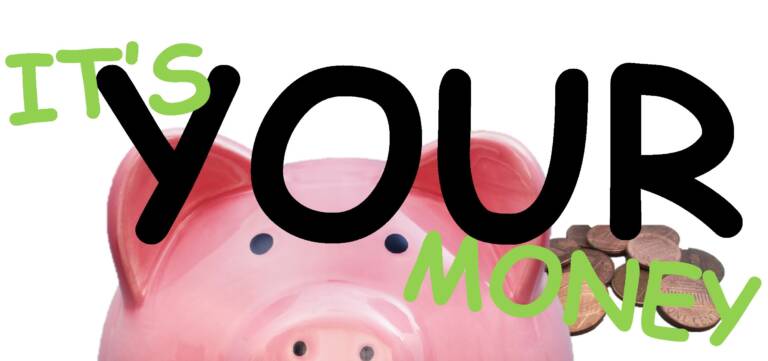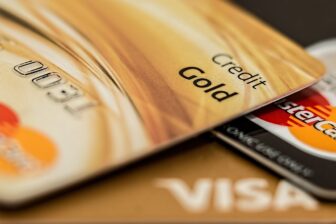
NEWS: Economists predict more pain for American consumers this year as inflation and supply chain issues continue amidst rising interest rates and out-of-control credit card spending.
WHAT IT MEANS TO YOU: Time to hunker down and get your finances in order.
Call it a New Year’s resolution or don’t, but the beginning of the new year is a good time to assess your finances and get them straightened out. As you know, ignoring a less-than-great financial situation or griping about high prices isn’t going to solve the problem.
Experts say that New Year’s resolutions – or whatever you want to call them – often fail because people set their expectations too high and then get discouraged when they can’t meet them.
Psychiatrist Dion Metzger, on a recent MSNBC appearance, gave some great advice. “We’re setting ourselves up with these huge goals,” she said. Her advice is to break things done and set small goals, focusing on the process, not on the end result.
Small things add up. No spending habit is too small to change if it saves you money. These small things are easier to deal with than making huge changes, and can lead to other small things and before you know it, you’re saving money.
This topic may look familiar, because in November I addressed cutting expenses. But today’s column looks at the small things everyone can do right now to save money. Here are five small things that are easy to do – honest! – that can eventually lead to a big impact on your pocketbook.
1. Start budgeting.
I know, I know! Everyone hates to hear this. But it works. A budget doesn’t have to be anything fancy. Simply write down all your income, write down all your fixed expenses (mortgage or rent, car payment, insurance, etc.), your other expenses (credit card bills, gas, groceries, etc.) and figure out how much discretionary money you have left over to spend on other things.
Clarifying what you owe and when, and how much money you have coming in is the foundation to saving money and making sure bills are paid on time. Unpaid bills cost you money.
Your budget isn’t a document that just sits there, but is something you check often and work with.
Some tips to keep bill paying on track are:
- Set as many bills as you can to auto-pay, and bunch them up on a specific date, like the first of the month. This helps you make sure they all get paid and you have the money saved up to do it.
- Color-code payments for ones that are auto-pay, and ones you must pay yourself. This helps you make sure you don’t miss one.
- Mark bills on the budget as they are paid each month, so you’ll know what’s still outstanding
- If you have more than one income source, specify which income source will pay what bill. This is a good way to make sure you have enough money to pay everything.
If there’s a way that works better for you, do it. The important thing is to keep track, get bills paid, and be consistent. It will save you money.

2. Corral credit cards
It’s hard, when you’re living paycheck to paycheck to not use credit cards. But they’re a never-ending high expense. If you don’t pay the entire balance every month, they are costing you a ton of money.
Last month, to end 2022, we looked at credit cards: the good, the bad and the ugly. This month, let’s just look at some small ways to cut back.
First, face reality and look at your credit card statement or statements. They are available online if you don’t get them in the mail. Look at how much it will cost if you only make minimum payments on your balance, and how long it will take to pay off. Check out the monthly interest you pay on what you owe. Wouldn’t it be great if you had that money in your pocket? Instead of trying to swear off credit cards, pick one (ideally the one with the highest interest rate) to not use and to pay down. Pay more than the minimum each month on that card and pay it down. Remember, don’t use it, as tempting as it may be.
If you stop using one high-interest card and pay it down, the amount you pay toward credit cards will decrease rapidly every month. If you are super-motivated, then go after the rest of your cards, too.
3. Do an expense audit
This is obviously not a new concept. Cutting expenses is the best way to save money, but it’s hard to do. What you need is a strategy. The digital age makes it super easy. Go online and take a look at the last 60 or 90 days of spending. Print it out, if you can. Then mark up all the things you spend money on that you can live without. This can range from streaming services, to eating out, to ebooks. Pick out one (or more!) that’s costing you money that you will eliminate.
It’s easy to rationalize that you “need” something, but when you take a serious look at how much you’re spending on it, maybe it’s not as important as you thought. You have to ask yourself, am I going to be an adult and take control of my spending? Or am I going to be a kid and insist I want this treat and then next week not have that $10 or $20 or whatever I could’ve used to put gas in my car?
It’s hard to eliminate a habit without replacing it with a new habit, so find something that doesn’t cost anything to replace the habit you’re cutting out.
For instance, libraries loan audiobooks and have all sorts of cool services that are free, including internet. See if you can substitute something you’ve been spending money on with something from your local library. Make yourself a nice cup of tea at night to take the place of that expensive snack you stopped buying. These are just examples. You’ll have to figure out what works for you, but that’s good, because it’ll make you start thinking about why you spend money on certain things and whether it’s worth it.
Cutting expenses is one of the most effective ways, along with reducing credit card bills, to have more money every month for the things you need.

4. Cut down on transportation costs
It’s impossible to do without a car in most of northern New England. Public transportation is inefficient, or nonexistent, depending on where you are, and likely doesn’t meet your needs. That said, check it out and see if there are times you can use it in order to save some gas.
Bigger picture, pick one day a week that you won’t use your car. Either walk where you need to go, use public transportation, or stay at home. Just one day of not using your car can save lots of money weekly.
Instead of picking up your kids at school or the bus stop in the car (and leaving it running while you wait), walk to get them. Not only do you save gas (and the environment), but you get some exercise and quality time with your kid.
When you do use your car, consolidate errands and trips, and use the most efficient route to spend the least amount of time driving. And for the sake of both your pocketbook and the environment, don’t leave your car running when you don’t have to.
There are likely lots of ways you can use less gas and offset some of the high cost – it’s a matter of breaking habits and maybe even being a little uncomfortable at times. The same goes for saving heating and air-conditioning costs in your home.
5. Grocery go-to
If your grocery store has a rewards or loyalty program, use it. I saved $103.25 in 2022 through my grocery store’s rewards program — $37.75 in redeemed rewards money for buying store brands and $65.72 in coupons. I’m single, with no kids at home, so my grocery bill is fairly small (especially after I cut out my serious ice cream habit). The amount you can save increases exponentially with the amount of groceries you have to buy.
The great thing about modern technology is that you don’t have to be a coupon-clipper. Most stores have an app that makes it easy. I try not to use coupons to buy anything I wouldn’t normally buy (which would defeat the purpose). An added benefit is I saved money simply by buying store brands that I normally would’ve ignored in favor of a named brand. My store also occasionally offers rewards members deals like $10 off on a $100 basket of groceries. Since I normally don’t spend that much in one outing, I use it to stock up on things like cat food, cans of beans, dishwasher detergent and other nonperishables.
Being part of a rewards program also sparks some intangible ways to save money. It makes you a smarter shopper, because you’re paying more attention to what you’re buying and how much it costs. You’re thinking more about your buying decisions.
My store also has a free (with any purchase) monthly magazine, available at the store, that’s full of recipes, buying tips and more. Don’t poo-poo this! I get a lot of great ideas that help keep me on track as far as making food at home rather than buying pizza or fast food. If you’re winging it every night as far as feeding yourself or your family, you’re likely wasting money. Try making meals in advance and freezing them for when you don’t have time to cook. And, I know, not having time to cook means not having time to prepare meals in advance. Make it work. Pick a day, maybe the day you’re going car-less, to prepare a casserole or stew, or something that’ll provide several meals for the week, or advance meals to have any time. If you have kids, get them involved in preparing and cooking.
My grocery store has also started stocking more prepared meals, or ingredients to make a meal or dish. If you live alone or have a small family, these can go a long way. Prepared food and meals are a great solution to having food at home without needing the time to cook from scratch, as long as they are an efficient use of your money.
One of my sisters was married to a guy who wouldn’t buy anything at the store if there was any food in the house. I’m not sure I could live that way – eat moldy bread (it’s fine if you scrape the mold off and toast it!) rather than get some yummy frozen pizza? Ugh. On the other hand, he never had to worry about how he was going to pay his bills every month.
For those of us not as, um, disciplined, it’s just important to find ways to cut down on last-minute food solutions or crazy grocery store spending. Planning out what you’ll eat and buy at the store is a great way to spend less. Get the kids involved and brainstorm ways to make it work.
No Quick Fix
One thing I left out that many similar columns include is “find a side gig.”
Anyone who reads this column knows what a slippery slope I think this advice is. Sure, it sounds great, because it’s a way to have more money without having to change spending habits or cut expenses
But side gigs, if they can be found, often have financial expectations that aren’t met, come with unanticipated costs, not just financially, but with time and resources, and can be a big hit to your peace of mind. If you can find one that’s guaranteed to add to your income without costing you in other ways, that’s great. But in general, it’s better to change spending habits, which will benefit you no matter how much money you make.
There’s no quick fix to having more money every month. Everyone’s financial situation is different. Everyone’s ability to make change is different, too. But one thing that will work no matter your situation is to have a positive attitude and talk yourself into making changes, even small ones, rather than talking yourself out of making changes. Little things do make a difference, and the peace of mind that comes with being able to pay your bills is priceless.

Thanks for the article – I suggest you include cycling in your mindset. Getting communities like Manchester to be MORE cycling friendly is a goal of Manchester Moves – you might “check them out”.
They have a wonderful Bike School Bus program you might help to promote their effort
Riding cycles is NOT only for recreation – but good for that also – check out NH Rail Trail Coalition that is helping to produce a safe riding route through Manchester.